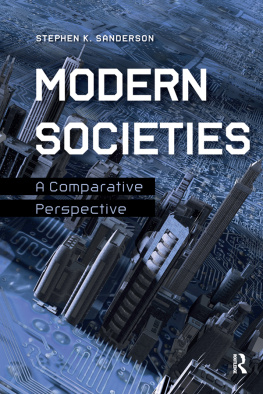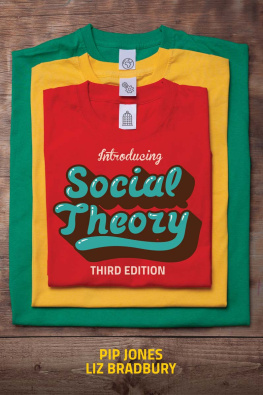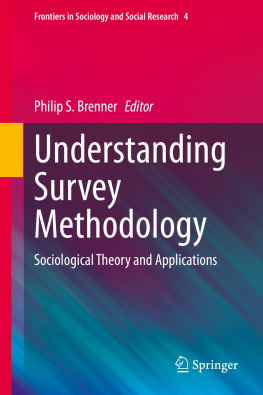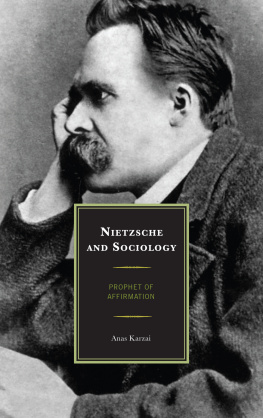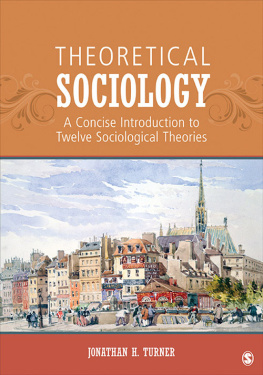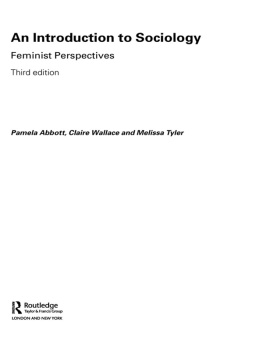Rethinking Sociological Theory
Rethinking Sociological Theory
Introducing and Explaining
a Scientific Theoretical Sociology
Stephen K. Sanderson
First published 2012 by Paradigm Publishers
Published 2016 by Routledge
2 Park Square, Milton Park, Abingdon, Oxon OX14 4RN
711 Third Avenue, New York, NY 10017, USA
Routledge is an imprint of the Taylor & Francis Group, an informa business
Copyright 2012, Taylor & Francis.
All rights reserved. No part of this book may be reprinted or reproduced or utilised in any form or by any electronic, mechanical, or other means, now known or hereafter invented, including photocopying and recording, or in any information storage or retrieval system, without permission in writing from the publishers.
Notice:
Product or corporate names may be trademarks or registered trademarks, and are used only for identification and explanation without intent to infringe.
Library of Congress Cataloging-in-Publication Data
Sanderson, Stephen K.
Rethinking sociological theory: introducing and explaining a scientific theoretical sociology/ Stephen K. Sanderson.
p. cm.
Includes bibliographical references and index.
ISBN 978-1-61205-205-2 (hc.: alk. paper) ISBN 978-1-61205-206-9 (pbk.: alk. paper)
1. Sociology. I. Title.
HM585.S26 2012
301dc23
2012003113
ISBN 13: 978-1-61205-205-2 (hbk)
ISBN 13: 978-1-61205-206-9 (pbk)
Designed and Typeset by Straight Creek Bookmakers.
Contents
Appendix ADeconstructing Postmodernism
Appendix BReforming Theoretical Work in Sociology
Appendix CThe Role of Conceptual Problems in Theory Choice
Appendix DThe Lay of the Land in Contemporary Theory
Appendix EHow to Teach Theory
(Due to length, appendices are not printed in this book. They are available in PDF format at www.paradigmpublishers.com.)
This book stems from my profound dissatisfaction with the state of sociological theory over the past three decades. Theory has become a major area of specialization within sociology in a way that it never was before, and the majority of sociologists who call themselves theorists have little connection with the rest of sociology. Most theorists have little interest in testing the theories they formulate, or even encouraging others to test them. Indeed, in many cases the very idea of theory testing is seen as being based on the wrongheaded epistemology of Western science. Too much of what passes for theory is concerned with exegeses of the masters and with the largely nonscientific work of chic European thinkers like Bourdieu or Habermas. And too often its aims are ideological rather than explanatory.
In this book I seek to recapture a scientific theoretical sociology, one that takes as its fundamental aim the formulation of real theories that can be empirically tested. To this end I pass in review the major theoretical traditions within contemporary sociology, explicating their key principles, critically evaluating these principles, and showcasing exemplars. With respect to each tradition I inquire into its degree of scientificity, which I judge by asking whether it has generated falsifiable research programs in the sense of the philosopher of science Imre Lakatos. If a tradition has generated research programs, how successful have they been? To use Lakatosian terminology, have they been progressive or degenerating programs? My contention is that the best theoretical traditions are those that have produced both the most research programs and the most progressive research programs.
If this book is seen entirely as a work of theoretical critique, then some may feel that my expositions are too long and cover too much familiar territory. This reaction is understandable, and yet it is clear that misrepresentation and distortion of theoretical traditions in sociology abound. For example, I have listened for several decades to rational choice theory being badmouthed and trashed on the basis of utterly incorrect understandings of this approach. But the same can be said to one extent or another of all of the major theoretical traditions. This is why I spend a considerable amount of time on exposition. If one is going to attack something, then one is obligated to be attacking a target that is accurate.
The time spent on exposition also makes the book suitable as a textbook in theory courses. Those who agree with my judgments of particular approaches would be the ones most naturally inclined to use it as a text, but even those who disagree may find it suitable for the classroom. Instructors can always pick at it and argue with it. Too many textbooks try to convey an air of neutrality or impartiality. This has its place, but I think that critically informed textbooks have a special value in helping to sharpen readers thoughts as they are reading along.
This book is the result of nearly forty years of thinking about and teaching both undergraduate and graduate courses in sociological theory. Many people have contributed to the sharpening of my ideas, but the most important ones have been the students in these classes. As everyone who has ever taught at the university level knows, being forced to explain complex ideas in simple terms is one of the best ways to deepen ones understanding of these ideas.
The problem of fragmentation within contemporary sociology is cause for concern among many sociologists and sociological theorists. Following the decline of functionalism in the late 1960s as the dominant theoretical perspective, Alvin Gouldner predicted an impending crisis in Western sociology. The prediction proved accurate, as twenty years later George Ritzer referred to separate and warring fiefdoms in sociological theory, and Jonathan Turner suggested that individual sociologists had simply come to do their own thing. Referring to the period of the late 1980s, Randall Collins sensed that sociology had lost much of its coherence and was at risk of decomposing into highly diverse specialties. And Donald Levine said that during this period sociology had been wracked by debilitating changes.
But, in fact, I think the situation today, another twenty years on, is actually worse, especially in sociological theory. Theory has been for some time a major area of specialization within sociology. Among the many specialized sections of the American Sociological Association, there is a healthy and vigorous (in terms of numbers) theory section. But what exactly is it that sociological theorists do, or at least have been doing in recent years? According to Janet Saltzman Chafetz, most of what is called sociological theory today falls under one or another of five basic types of intellectual activity:
1) the Talmudic exegesis of classics by long dead scholars and their minor revisions to fit more contemporary concerns (e.g., what did Marx, Weber, Parsons, etc., really mean? or how can their ideas be stretched to relate to each other or something else?); 2) the paraphrasing (showing the relevance) of contemporary, mostly European, inevitably pretentious, often incomprehensible and typically anti-positivistic metatheories (e.g., Postmodernism, Poststructuralism, Semiotics, Hermeneutics, Discourse, and Critical Theory); 3) abstract epistemological and ontological navel-gazing (e.g., the relationship between agency/micro and structure/ macro, theory as discourse, text as reality, all the how to theorize about papers); 4) conceptual development and (sometimes) application; and, closely related to this, 5) substantive, explanatory theory.


